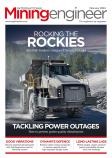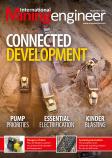Torbjorn Idhammar is president of IDCON, a highly specialised management consultant firm in the field of reliability and maintenance management. The company's mission is to improve overall reliability and minimise total production cost. It works with the mining industry and other heavy process industries' maintenance organisations to improve the work management processes of Preventive Maintenance, Planning and Scheduling, Root Cause Problem Elimination, and Materials Management. In the following article, Idhammar shares his expertise with regard to improving maintenance operations.
I don’t think any of us have missed the outlandish success in the telecomm industry and how strong the Apple brand has been – for decades. The fact that others in the industry are inching in is testimony that Apple’s company culture and belief system works, and also means that there is room for more players in the market. What can we in the industrial sector learn from these global giants who seem to be enormously profitable and not just driving the market but owning it?
Improving maintenance is the same thing; we have to get people to buy into the concept, changes or new plan. They have to believe in it. I think it’s crucial to have a foundational maintenance belief, organisation specific. Only when we have a common belief, can we reach our goals together.
Since Steve Jobs and his partners started the company in the 1970s, Apple has worked for a common belief and created a process that’s really pretty simple. It identifies something people want and believe in, then calls in the engineers. Take, for example, the last update to the iPhone: Apple wanted people to be able to navigate their phones with one hand, so it designed the phone with all icons within reach of the thumb. I think we in the industrial world can learn from this.
Apple sells its products by first establishing and explaining its vision and product design. Check out the video on the new watch at apple.com, for example. A British engineer explains that Apple has a ”compulsion” to design accessible, relevant and personal technology. There are no ”shop now” buttons to choose from in order to make a quick sell. Apple hasn’t even communicated exactly what it is selling yet, but I want to buy it already 10 seconds into the video. Compare that with Hewlett Packard, for example. If you visit HP's website and click on ”tablets” you’ll see at least five ”buy now” options. No vision. No nerdy-but-charming engineer from England speaking about beliefs – it is just selling a piece of technology. How inspiring is that?
So, how do I connect Apple’s approach with maintenance improvement? Maintenance improvement is about changing people’s behaviour and habits. I think it’s much easier to improve an organisation if we are selling an ideology instead of a list of tasks to be performed. If we believe in the same goal, we’ll always find a way to reach it.
Let’s say that you and I believe it’s important to have clean oil in our equipment. We really believe in this and are willing to invest money and time to keep clean lubrication storage, choose the right oils, and handle the oil properly while filtering it to specification before filling our machines. Compare that convincing those in your operation that we need clean oil while also giving them a list of tasks. Perhaps we need both, but “selling” a concept will do better if we use a common belief.
We have developed our beliefs at IDCON, and we are happy to share them and what has worked for us with our clients. Here are a couple of examples to keep in mind once you start working on yours:
• Improved reliability drives expenses: when an organisation implements better work processes at the outset the cost will be higher; as execution of better work processes improve the costs will reduce overtime.
• Maintenance improvement is 90% about people
• Employees cannot be more productive than the system they are working in
• It is the boss’s responsibility to develop work processes.
• We need clean and well-organised lubrication storage
• Planning is done before scheduling
• People who seem busy aren’t necessarily productive
• Most companies know what they need to improve, but have problems with how to execute/perform
What do you believe in? Let me know by sending me an email at info@idcon.com





















